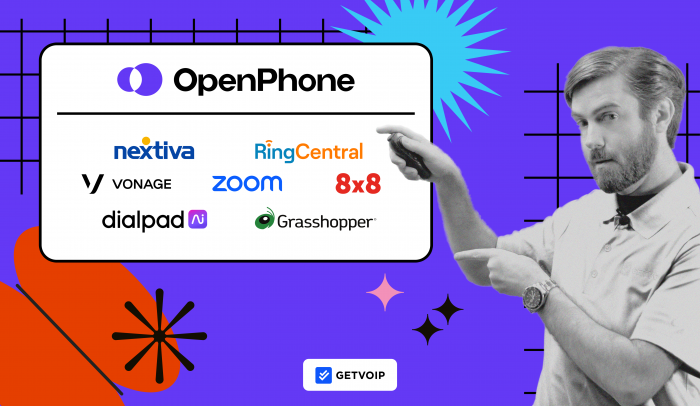Cloud-based phone systems like OpenPhone combine voice, chat, SMS, and team collaboration capabilities into one platform. With plans from $15/user/month, OpenPhone offers competitive pricing and AI-powered features like automated post-call summaries and transcripts. However, OpenPhone is not HIPAA compliant, has no stated uptime guarantee, and limits customer support to email and chatbot for all plans except the quote-based Enterprise package.
OpenPhone alternatives offer more advanced features, better customer support availability, and a higher number of third-party integrations across voice and digital channels.
We have listed some of our favorite alternatives to OpenPhone in the sections below, outlining pricing, plans, what they provide in comparison to OpenPhone, and where they fall short.
Here’s a quick overview of the top OpenPhone alternatives:
| Provider | Pricing | Standout Features | Integrations | Best For |
| Nextiva | $18.95 to $32.95 per month per user |
|
Offers several integrations including Salesforce, Zoho, Hubspot, Zendesk, Teams, etc. | Value-Focused SMBs |
| RingCentral | $20 to $35 per month per user |
|
Over 300 pre-built integrations including Google, Microsoft, etc. | Companies that need a full-suite solution |
| 8x8 | $24 to $44 per month per user |
|
Dozens of integrations including Zendesk, Zoho, ServiceNow, Freshdesk, etc. | International Companies |
| Dialpad | $15 to $25 per month per user |
|
Open APIs as well as prebuilt integrations such as Salesforce, Outlook, Chrome, etc. | Remote teams |
| Grasshopper | $15 to $55 per month |
|
Grasshopper does not directly integrate with other platforms | Solopreneurs and Startups |
| Zoom | $10 to $23 per month per user |
|
Over 1,000 integrations including Jira, Asana, Marketo, etc. | Webinars and Video Conferencing |
| Vonage | $19.99 to $39.99 per month peruser |
|
Open APIs and pre-built integrations such as G Suite, Salesforce, Microsoft Dynamics, etc. | SMBs that need a custom solution |
Why Look For An OpenPhone Alternative?
OpenPhone is a solid choice for startups and SMBs that need a straightforward phone system, but the platform is lacking in a few areas. The top reasons why businesses look for OpenPhone alternatives are:
- Customer support: OpenPhone Starter and Business users only get customer support via email and a poorly-designed chatbot that doesn’t offer two-way conversation
- Lack of advanced features: OpenPhone does not offer advanced UCaaS features like video conferencing, or real time analytics
- Compliance: OpenPhone is not yet HIPAA, HITECH, FedRAMP, or PCI compliant
- Limited Integrations: Salesforce, HubSpot, and Gong integrations are not included with the Starter plan, and OpenPhone offers limited integrations overall compared to competitors
- Reliability: OpenPhone does not offer a stated uptime guarantee to limit service interruptions, poor call quality, jitter, and latency. OpenPhone users have continually reported interruptions in service
- Security: OpenPhone does not offer advanced security features like single sign on (SSO), multi-factor authentication, or end-to-end encryption
How We Ranked OpenPhone Alternatives in This Article
We selected and ranked the business VoIP providers in this article based on several factors:
- Features: What advanced features does the provider offer, and how does the platform leverage AI to streamline business processes and empower customer self-service? Does the solution include unified communication and team collaboration tools across voice and digital channels? What third-party integrations are available?
- Pricing: How do provider pricing options compare to competitors? Which features does each plan include, and what add-on features are available? Does the provider offer a good overall value for money and pricing for a variety of budgets? Is a free trial included?
- Ease of use: How long does the installation, onboarding, and user training process take? Is the dashboard/agent interface intuitive and customizable, or overcrowded and confusing? Are both mobile and desktop app versions user-friendly?
- Customer support: What are customer support hours, channels, and response times? Are add-on customer support features like a dedicated account manager or priority customer service available?
- Security/Reliability: What compliance certifications and security features does each provider have (two-factor authentication, biometrics, HIPAA and SOC 3 compliance, etc.)? Is data end-to-end encrypted, and is 24/7 network monitoring available? What is the guaranteed uptime?
Best OpenPhone Alternatives and Competitors
The OpenPhone alternatives reviewed below offer better features, customer service, various pricing options, and more. We reviewed these VoIP providers to find areas where they are better than OpenPhone and thus can be a better alternative. Read on to see which of the providers is good enough to replace your current solution and fit business needs.
1. Nextiva
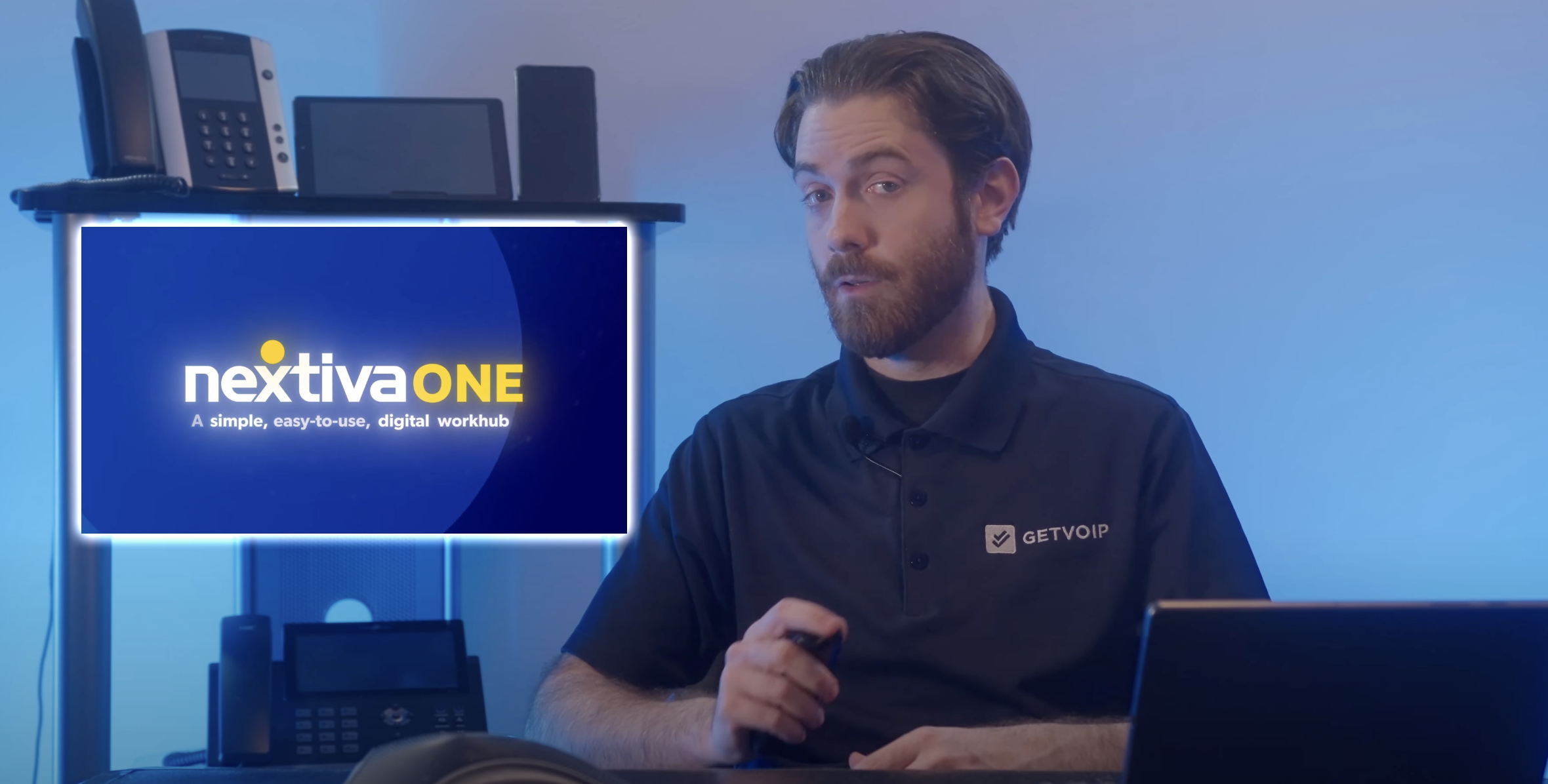
Nextiva is a leading provider of Unified Communications as a Service (UCaaS) for startups and SMBs. Their services include unlimited voice and video calling for all plans, desktop and mobile SMS/MMS, and 24/7 live customer support.
Nextiva is slightly more expensive than OpenPhone, with plans starting from $18.95/user/month. However, unlike OpenPhone, Nextiva offers real-time analytics, multi-level IVR and, and high-level integrations with apps like Microsoft Teams, ServiceNow, and Zendesk.
Overall, Nextiva is a better choice for SMBs with a high call volume or remote teams needing collaboration features like video conferencing and live user presence updates.
Nextiva is a Good Alternative to OpenPhone if You Need:
- Secure platform: Nextiva offers superior security to OpenPhone with features such as single sign on (SSO) and an uptime guarantee of 99.999%
- Efficient customer service: Nextiva is well known for their attentive customer support team which offers 24/7 live service on all plans
- Scalability: Nextiva offers 3 tiered small business phone system plans with the option to upgrade to a cloud contact center
Pricing & Plans
Nextiva, offering a comprehensive suite of VoIP services, integrations, and advanced features, typically comes at a higher price point. OpenPhone, on the other hand, provides a more budget-friendly option for small businesses and startups that need basic VoIP capabilities and simplicity.
Nextiva offers three pricing plans:
- Essential Plan ($17.95-$23.95 per user/mo. paid annually): Includes unlimited calling in the U.S. and Canada, up to 1500 toll-free minutes, and video conferencing for up to 250 participants with a 45 minute duration limit. Features include call forwarding, voicemail-to-email and team chat.
- Professional Plan ($21.95-$27.95 per user/mo. paid annually): Includes up to 3,000 toll-free minutes and audio conference calls for up to 40 participants. Additional features include multi-level auto attendant, screen sharing and CRM integrations.
- Enterprise ($31.95-$37.95 per user/mo. paid annually): Includes audio conference calls with unlimited participants, up to 12,500 toll-free minutes and additional features such as call recording, voicemail transcription and single sign on.
Key Features
Here are some key features offered by Nextiva:
- Call Pop: Automatically displays key caller and account information and interaction history on agent screens when a call is accepted. In-call screen pops display account value, customer experience score, and customer survey responses for a personalized support experience
- NextivaONE mobile app: Mobile app for iOS and Android smartphones lets users instantly call, conference, chat, video, or share their screen from a cell phone (users can also switch seamlessly between desktop and mobile devices)
- Automations: Nextiva automates repetitive tasks and workflows like appointment reminders, follow-ups, initiating campaigns, and assigning tasks
- Call Analytics: Gives managers deep insights into agent performance and operations via historical and live call data, real-time call tracking, pre-made templates and custom reporting, push notifications, and employee performance gamification
User Experience
Nextiva offers a number of customizations through integrations and APIs, while still providing a clean, usable interface with a fast learning curve. Although Nextiva provides more third-party application options than OpenPhone, they are not deep integrations.
Though not as intuitive as the OpenPhone mobile app, Nextiva for mobile devices includes immediate transfer, warm transfer, and presence/status updates.
Nextiva Pros:
- Live phone support along with web chat, and email support is provided for all users
- Seamless onboarding process with helpful tutorials offered on-demand
- Reliable service with a 99.999% uptime guarantee, 8 points of presence in the U.S., and 24/7/365 monitoring.
Nextiva Cons:
- Hardware compatibility is limited to a small number of desk phones and third-party systems
- Users complain that Nextiva’s interface is confusing and overcrowded
- Some advanced features such as intelligent virtual agents, real-time dashboards, and wallboards are only offered as paid add-ons
2. RingCentral
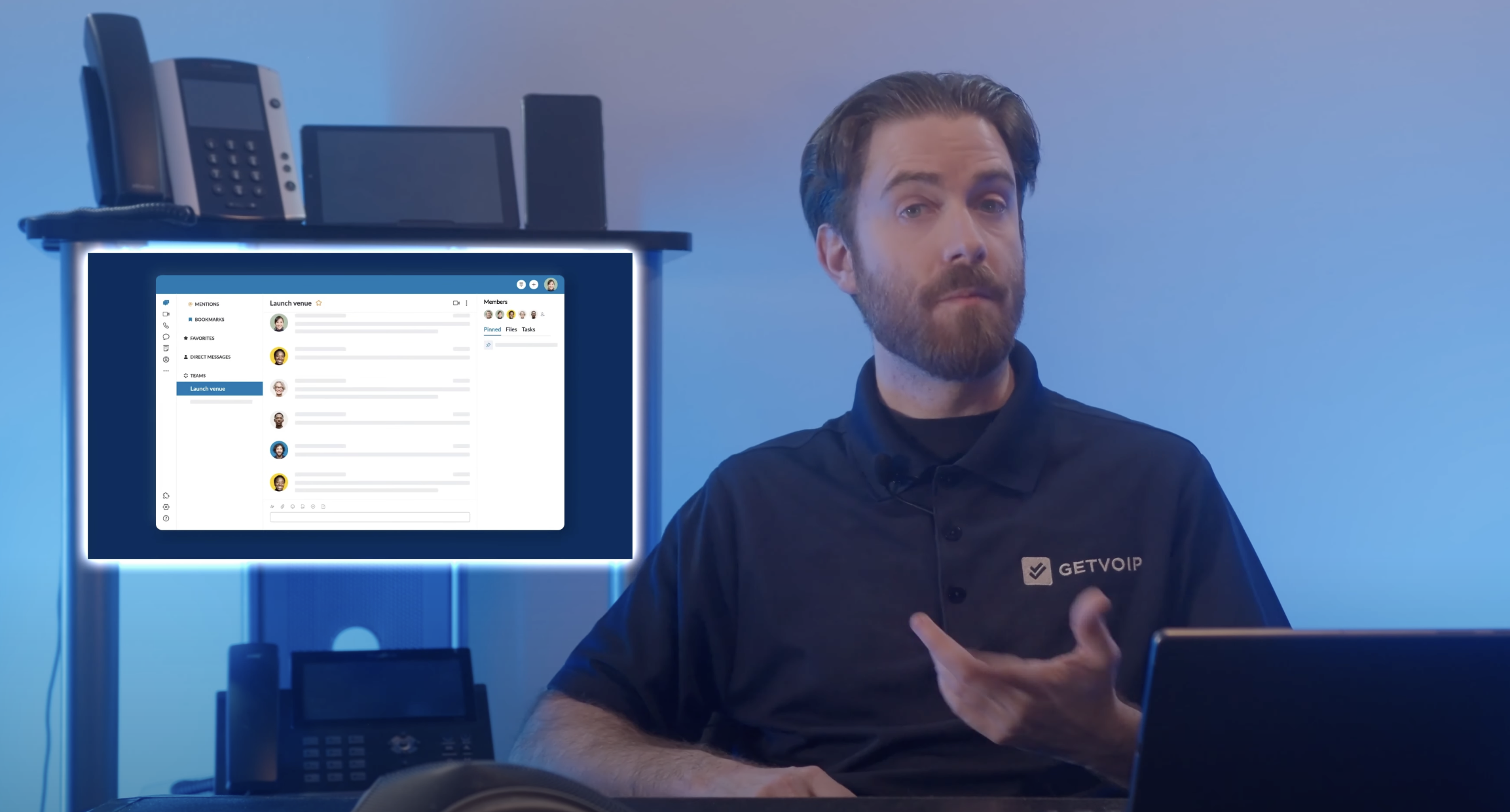
RingCentral is a leading virtual phone system offering business VoIP, UCaaS, and CCaaS solutions. It’s known for its advanced communication suite, RingEX. This solution is highly secure and reliable, with end-to-end encryption and a 99.999% uptime service level agreement.
One of the most impressive features of RingEX is its robust video conferencing platform. RingCentral's pricing may be a challenge for smaller businesses, as its most affordable Essentials plan doesn't include features like video conferencing, internet faxing, call recording, or auto-attendant.
RingCentral is a Good Alternative to OpenPhone if You Need:
- Security: All RingCentral plans include advanced security features like end-to-end encryption, SSO, multi-factor authentication, etc.
- Integrations: RingCentral boasts one of the largest integration ecosystems in the UCaaS space with over 300 out-of-the-box integrations
- Advanced analytics: RingCentral offers AI-powered reporting and analytics in real-time with customizable dashboards
Pricing & Plans
RingCentral is priced higher than OpenPhone, but it offers more security, reliability, and communication channels. OpenPhone’s starter plan may be a better choice for small businesses that need a budget friendly voice/text only solution, but RingCentral’s Core plan is a better price and includes more features than OpenPhone’s Business plan.
RingCentral offers three different pricing plans. Below is a breakdown.
- Core plan ($20 monthly per user): The Core plan includes all RingCentral’s basic channels and phone-system features, although some features have limited access. It offers unlimited multi-level IVR, on-demand call recording, and basic call queues. Core video meetings have a 100-participant maximum, and the analytics include call logs.
- Advanced ($25 monthly per user): The Advanced plan adds intelligent call distribution and queueing rules, automatic call recording, and the full analytics suite. It also includes RingCentral’s full integration set and allows administrators to customize user roles and permissions.
- Ultra ($35 monthly per user): The Ultra plan includes enterprise-grade HD video meetings with AI-powered meeting tools, like summaries and live transcription. It also includes enhanced analytics like custom dashboards, weekly report subscriptions, and wallboard views. Intended for large companies, this plan also includes unlimited file sharing.
Key Features
- Team Messaging: RingCentral’s team messaging space enables users to send instant messages, share files, assign tasks, or jump onto a video call from one unified space. Admins can easily add external or internal contacts to group chat. Persistent video chat rooms can also be set up, allowing remote team members to connect whenever they like
- Video Conferencing: 200 meeting participants (Standard plan and above), access to video features like noise reduction, AI-generated topics/summaries/highlight reels/transcripts, Presentation Mode, Auto Follow, Whiteboarding, Breakout Rooms, Participant Reactions, Team Huddle, End-to-End Encryption
- Business SMS: Users can send, receive and handle calls, SMS messages, images, attachments, design-heavy texts, and faxes in one place while meeting carrier compliance requirements
- Dial-by-Name Directory: Allows callers to search for any employee name (first and/or last) and reach team members on any device
User Experience
RingCentral has an intuitive user interface and unlimited customizable options thanks to a diverse set of native features and an extensive array of integrations. RingCentral provides higher quality voice service than OpenPhone, with a 99.999% uptime guarantee.
One of the main advantages of RingCentral over OpenPhone is RingCentral’s video conferencing platform, which is included in all RingCentral UCaaS plans. Like its dashboards, RingCentral video meetings are highly customizable, with advanced screen sharing options, roles/permission assignments, and host controls.
RingCentral Pros
- Secure video conferencing platform with advanced features such as AI-powered live transcription and meeting insights
- Superior voice quality with a 99.999% uptime guarantee and end-to-end encryption for all users
- Highly customizable, multi-level auto attendant and IVR available for all users
RingCentral Cons
- Expensive compared to competitors like OpenPhone
- Customer service agents are slow to respond according to users
- Highly customizable platform can lead to long adoption times
3. Vonage
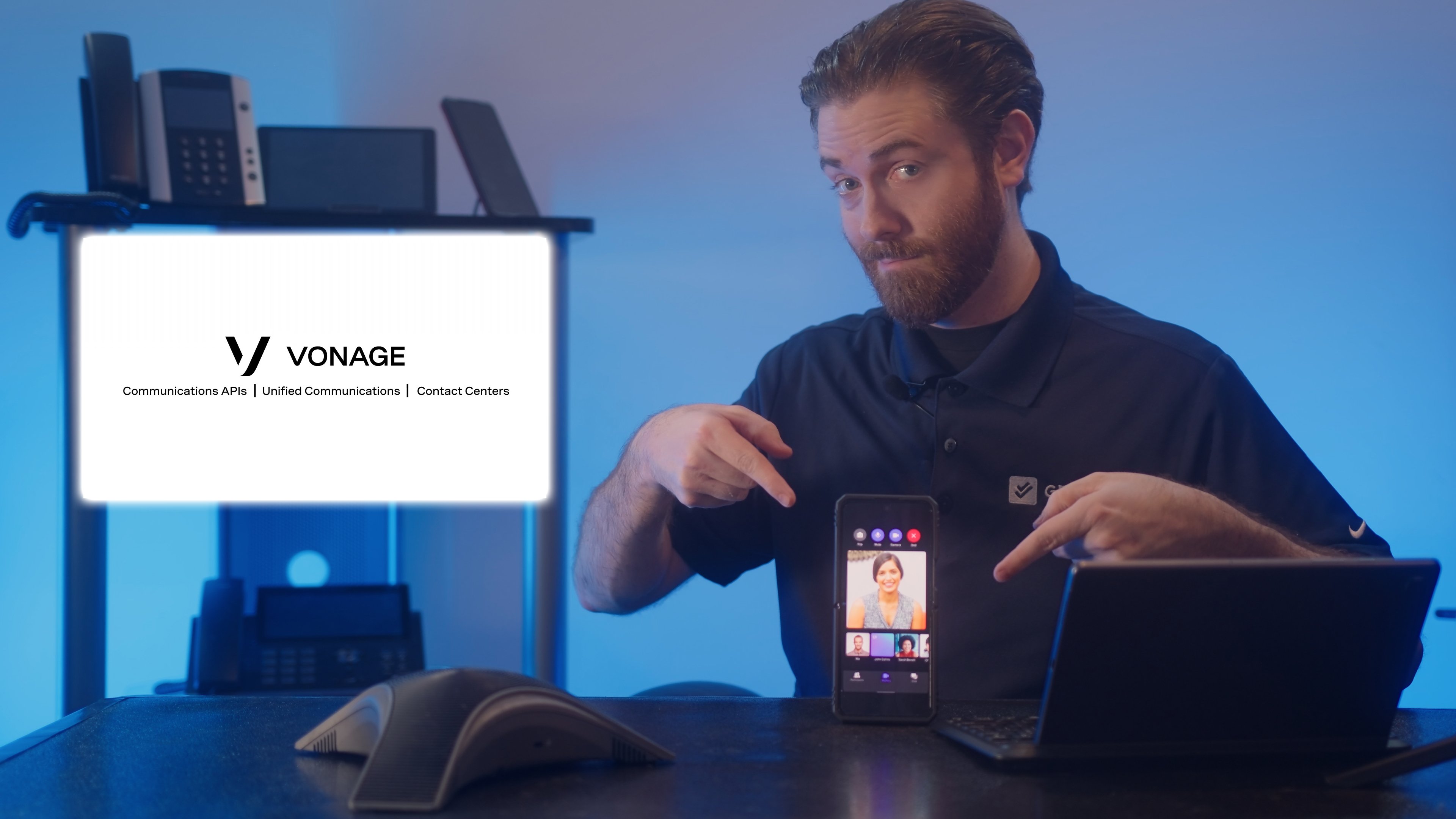
Vonage is a top hosted PBX provider ideal for small and medium-sized businesses (SMBs) looking for a highly customizable communication solution. Its flagship product, Vonage Business Communication (VBC), offers a comprehensive suite of communication tools, including voice, messaging, and video capabilities.
Notably, Vonage's platform boasts exceptional call quality with a 99.999% uptime. In addition to its reliability, Vonage is also a cost-effective option, with plans starting at $14.99 per user per month–making it an attractive choice for SMBs that don't require add-ons.
Vonage is a Good Alternative to OpenPhone if You Need:
- A custom solution: Vonage offers voice and video APIs as well as many prebuilt integrations, allowing users to create a completely custom experience
- Flexible pricing: Vonage pricing starts at $19.99/user/month, but they generally offer rates as low $13.99/user/month if no advanced features are needed
- Reliability: Vonage offers a 99.999% uptime SLA along with advanced security features such as single sign on
Pricing & Plans
Vonage is priced higher than OpenPhone, but it offers more reliability and security with an uptime guarantee of 99.999%, SSO, and HIPAA compliance. Many of Vonage’s features are offered as add-ons instead of being included in bundled plans like OpenPhone-which further drives up the price-but it does allow users to only pay for what they need.
Below is a breakdown of Vonage pricing.
- Mobile Plan ($19.99 per user/mo.): Includes unlimited voice, SMS, and team messaging.
- Premium Plan ($29.99 per user/mo.): Includes unlimited meetings up to 100 participants, multi-level auto attendant, and IP desk phone capability.
- Advanced Plan ($39.99 per user/mo.): Additional features include on-demand call recording, call groups, and visual voicemail.
Standout Features
- Virtual Receptionist: Provides callers with a list of pre-recorded call menu options, prompting callers to direct their own calls without a live agent. Admins can configure call routing strategies for holidays, weekends, individual agent schedules and skill sets, after-hours, and emergencies
- Call Screening: Allows admins to require inbound callers to identify themselves by recording their name so agents can then decide to answer, forward, or transfer the call accordingly
- Business Call Recording: Available as an add-on for $49.99 per month, lets admins create custom and automated call recording rules, store 500 hours of call recordings, download and email recordings, search and replay recordings in the VBC portal
- Secondary Line Appearance (SLA): Available as an add-on for $14.99/month, lets users answer and place calls from different extensions via a single desk phone, hold calls on a specific extension or join other extensions
User Experience
Similar to OpenPhone, Vonage includes essential business features without a lot of extras. Unlike OpenPhone, the Vonage Business Cloud (VBC) platform includes video conferencing in most plans.
Vonage is a more customizable system than OpenPhone due its open API design and many add-on features. Vonage’s mobile app is also more robust than OpenPhone’s, with Vonage users being able to join video meetings, chat with colleagues, and forward calls from the mobile app.
Vonage Pros
- Affordable international calling plans offered
- Several free integrations included such as Zendesk, GSuite, and Microsoft Dynamics
- User-friendly interface across video, voice, SMS and chat platforms
Vonage Cons
- Extra charges for onboarding assistance and system set up
- Some features such as conference bridge and call recording are only offered as add-ons
- Users report that reaching customer service agents is difficult and representatives close out conversations early
4. Dialpad
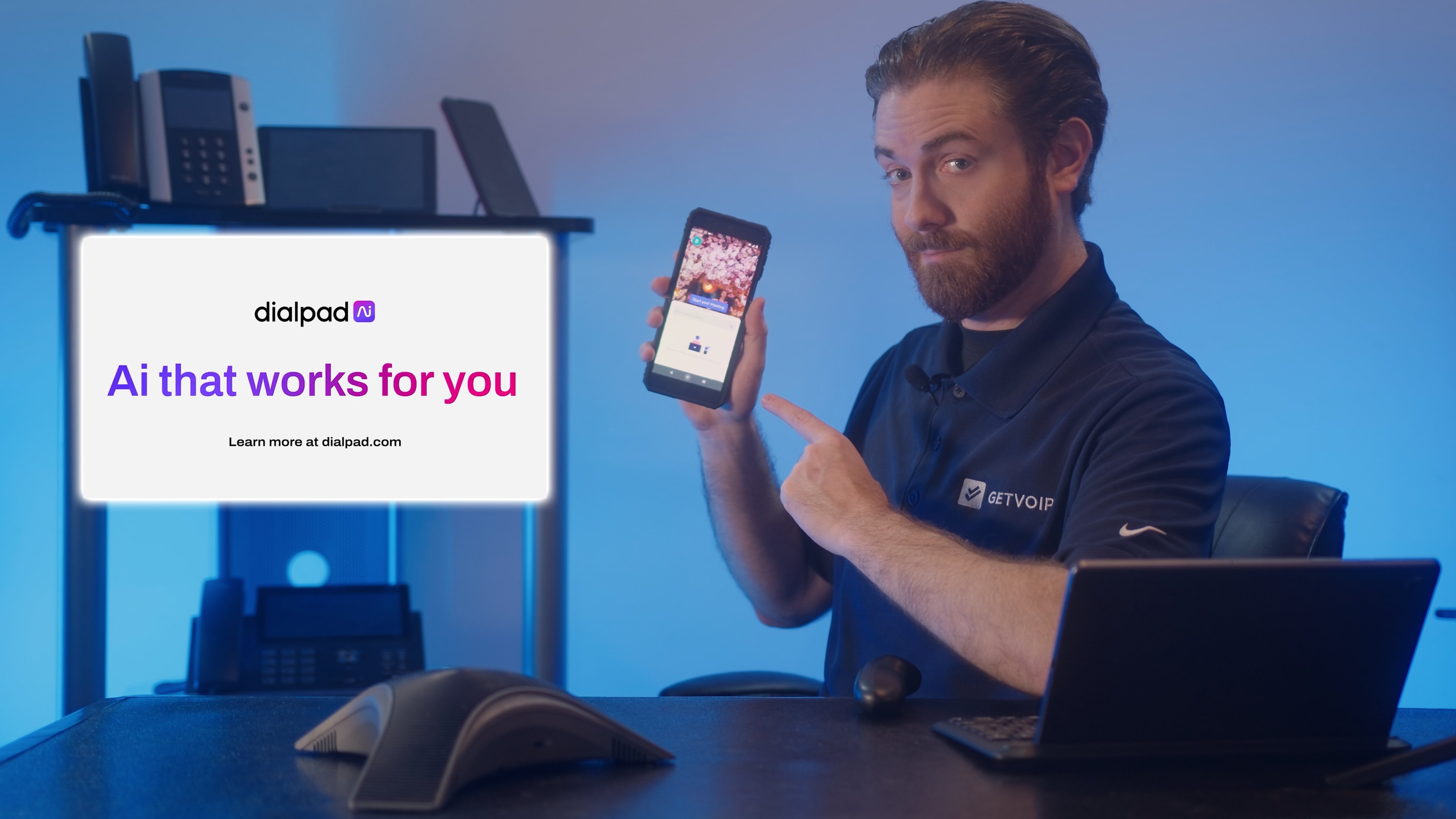
Dialpad is a leading VoIP service and unified communications provider known for its substantial investments in Artificial Intelligence and Natural Language Processing (NLP) research. Dialpad's platform offers a suite of advanced communication features that leverage AI, including real-time voice transcription, post-call summaries, and sentiment analysis. Dialpad is one of the few service providers that has a 100% uptime guarantee, ensuring uninterrupted connectivity for its users.
Dialpad includes voice, messaging, and video capabilities, making it a highly versatile solution. One of the most attractive aspects of Dialpad is its affordability, offering its cutting-edge communication tools at a highly competitive price point.
Dialpad is a Good Alternative to OpenPhone if You Need:
- An affordable solution: Dialpad offers some of the most inexpensive UCaaS plans on the market
- To increase productivity: Dialpad includes a number of AI-powered features that lessen strain on employees such as automatically generated call summaries, auto dialers, and more
- A reliable voice solution: Dialpad offers superior reliability with a 100% uptime SLA
Pricing & Plans
Dialpad and OpenPhone are comparable in pricing. Dialpad offers more reliable service, integrations, and AI-powered tools than OpenPhone, but charges extra for toll-free numbers and has seat minimums on most plans. OpenPhone includes toll free numbers in all plans, and does not have seat minimums.
Dialpad offers three pricing plans. Below is a breakdown.
- Standard Plan ($20 per user/mo.): Includes unlimited calling, video meetings with up to 10 participants, three ring groups, and team messaging. Features include multi-level auto-attendant, visual voicemail, and real-time analytics.
- Pro Plan ($30 per user/mo.): Includes 25 ring groups and a local or international number for each user. Additional features include international SMS, CRM integrations, and 24/7 live support.
- Enterprise Plan: Includes unlimited ring groups. Additional features include extensions, 100% uptime SLA and a dedicated support manager. There is a 100 seat minimum.
Key Features
- Live Speech Coaching: AI-powered tool which displays suggestions to agents while they are on a call, such as reminding them to slow down or speak clearly
- Video Meetings: Dialpad video meetings for up to 10 participants to meet for up to 5 hours are available in all plans (Dialpad Meetings, with up to 150 participants, can also be purchased separately for $15.00/user/month.) Video features include screen sharing, whiteboarding, in-meeting chat, virtual backgrounds, and a meeting waiting room
- Multi-Level Auto Attendant: Lets admins create a call management system that automatically routes calls to the appropriate agent. Admins can set custom messages to play during set hours, set call flow priorities, and use various routing methods such as longest idle, skills based and first available agent
- Topic-Based Team Messaging: Lets users create dedicated channels based on topics or projects, search by keyword, and share content with internal and external users
User Experience
Dialpad provides a user-friendly and employee-centric experience, with team collaboration tools like conferencing, gamified analytics, and a Chrome extension for easy access.
The platform also has a number of account management options. Dialpad admins are able to add/remove team members, proxy into a user’s account, enable automatic call recording, and more. OpenPhone’s admin dashboard on the other hand is much more minimalistic, with options to invite team members and manage billing/account information only.
Dialpad Pros
- Natural language processing features, such as live transcription and call summaries are some of the best in the VoIP space
- Standard plan is a great value with secure voice, text, and video for $15/month/user
- Real-time reporting and AI-powered analytics are included for all users
Dialpad Cons
- Video meetings are limited to just 10 participants
- Live phone support is only offered to Pro and Enterprise plan users
- Dialpad’s interface can be clunky and difficult to use especially when it comes to using search and filter tools
5. Zoom
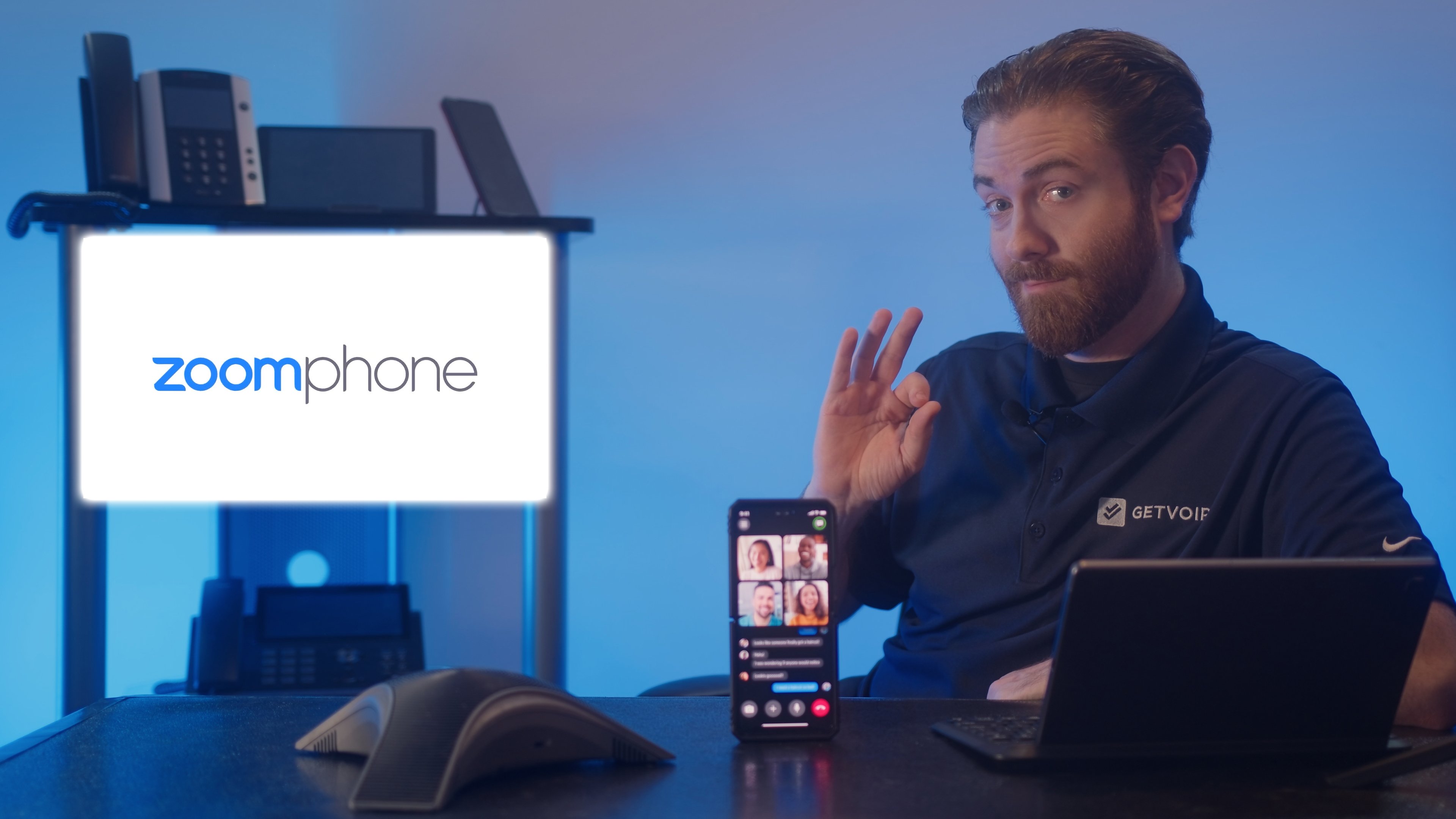
Zoom is a well-known video conferencing provider that has quickly gained recognition in the UCaaS market by offering a comprehensive platform (Zoom One) with voice, chat, team messaging, and video communication tools.
As a newer UC provider, Zoom does not offer a guaranteed uptime like more established brands, and it lacks advanced VoIP features. Nonetheless, Zoom has developed a solid stack of voice, video, and collaboration capabilities, making it a highly attractive option for businesses looking for a reliable and cost-effective communication solution.
Zoom is a Good Alternative to OpenPhone if You Need:
- Team collaboration features: Zoom offers several AI-powered collaboration tools such as whiteboarding, digital avatars, team chat, and webinar features
- Secure communication: Zoom’s video meetings offer advanced security features such as end-to-end encryption, meeting lock, etc.
- An affordable solution: Zoom has some of the most inexpensive VoIP pricing plans in the space as well as a free plan
Pricing & Plans
The Zoom Phone metered plan is quite a bit cheaper than OpenPhone, but, as the name suggests, outgoing calls are charged on a per-minute basis. The metered plan is a great option for companies that don’t use a lot of minutes. Zoom Phone’s Unlimited plan is the same price as OpenPhone’s Starter plan, but it offers a few features that OpenPhone doesn’t have such as call whisper, dial-by-name directory, and hot desking.
Zoom Phone has three pricing plans:
- U.S. & Canada Metered ($120 per year/user): Includes metered outbound calling, SMS/MMS, unlimited inbound calling, auto attendant/IVR, call monitoring, call recording, and voicemail transcription
- U.S. & Canada Unlimited ($180 per year/user): Includes unlimited outbound calling
- Global Select ($240 per year/user): Includes unlimited regional calling in one of 48 countries
Zoom One has five plans, including a free version:
- Basic Plan (Free): Includes up to three whiteboards, team chat and video meetings with 100 participants up to 40 minutes in length
- Pro Plan ($12.50 per user/mo.): Includes video meetings of up to 30 hours and up to 100 participants
- Business Plan ($16.65 per user/mo.): 300 video meeting participant cap and includes unlimited whiteboards ad 5GB of storage
- Business Plus Plan ($20.83 per user/mo.): Includes unlimited calling, auto attendant, toll-free numbers, real-time reporting and SMS/MMS
- Enterprise Plan: Includes Webinar 500, ROI tracking, and video meetings with up to 1,000 participants
Key Features
- Call Recording: On-demand or automatic call recording and transcriptions, recording archiving, playback, retrieval
- Call Monitoring: Call monitoring (allowing supervisors to silently listen to agent calls), call whisper (allows supervisors to talk to the agent without the other party hearing), and call barge (allows supervisors to transform agent calls into a 3-way call)
- Video Meetings:Host video meetings with 100 to 1,000 participants with features like meeting lock, waiting room, admin controls,End-to-End Encryption, virtual backgrounds and custom filters, breakout rooms, handriasing and polling, pin participant videos, screen sharing, live streaming
- Whiteboard: Real-time team member collaboration with automatic syncing and tools like smart connectors, sticky notes, commenting, and drawing
User Experience
Zoom’s platform is more complicated than OpenPhone, but it is also more flexible and scalable. Zoom Phone users can choose between metered, unlimited or international calling packages which all include a surprising number of features such as auto attendant, call monitoring, and call recording.
As companies grow, they can switch over to Zoom One which combines phone features, video meetings, team chat, and whiteboards under one pane of glass.
Zoom’s dashboards are user friendly and intuitive and its video conferencing platform is one of the most secure and innovative in the space.
Zoom Pros
- Easy to scalable with Zoom webinar services and Zoom Contact Center
- Flexible platform with the option for a voice only or full service unified communications plan
- High quality audio and video compared to OpenPhone
Zoom Cons
- Some features such as premium customer support, toll-free numbers, and advanced analytics are only available as add-ons
- Lacks some advanced phone features such as sentiment analysis, conversational IVR, etc.
- In its Free, Pro and Business plans, Zoom One offers video and whiteboard features without voice.
6. 8x8
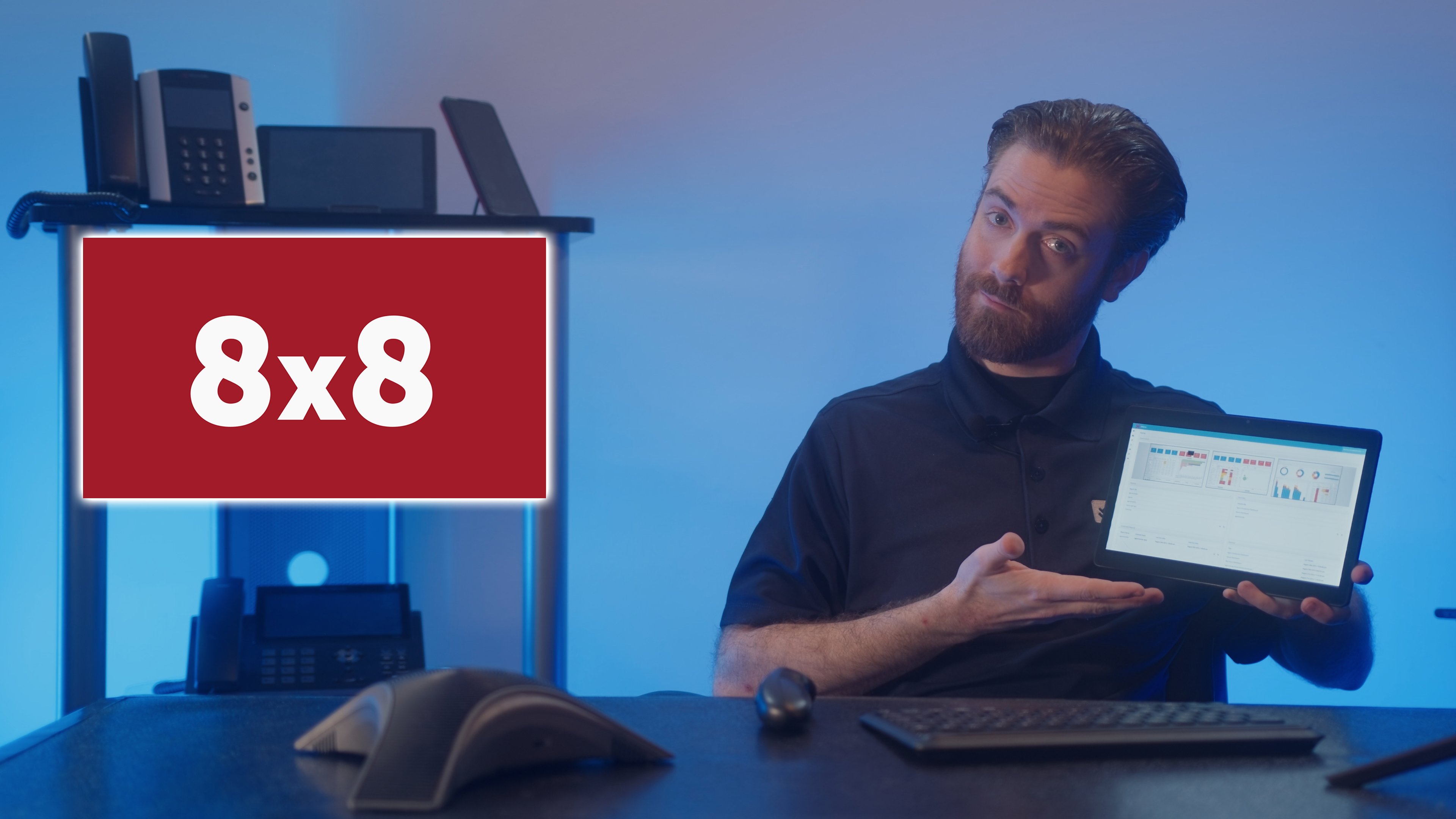
8x8 is a cloud-based communication and call center software platform that provides a suite of voice, video, messaging, and contact center features at competitive prices. 8x8’s platform is designed to help businesses of all sizes improve internal and external communication by providing a seamless platform stacked with advanced features and international calling to 48 countries.
8x8 integrates with various business applications like Salesforce, Microsoft Teams, and NetSuite, making it a versatile and customizable solution for remote and blended workplaces.
8x8 is a Good Alternative to OpenPhone if You Need:
- Large video conferences: 8x8 admins can host video meetings with up to 500 participants
- A scalable solution: 8x8’s X-series includes plans with both unified communications and contact center functionality
- Advanced call routing: 8x8 offers a number of advanced routing features such as intelligent IVR (IIVR), skills-based routing, and CX journey mapping
Pricing & Plans
8x8 no longer lists their prices publicly, but less than a year ago, their plans started at $24 per month, per user, which is significantly more expensive than OpenPhone. In exchange for the high price tag, 8x8 offers a number of benefits that OpenPhone doesn’t, including unlimited international calling, large scale video conferencing, and AI-powered analytics. 8x8 is best for contact centers and large businesses.
8x8 offers two UCaaS pricing plans:
- X2 Plan ($24 per user/mo.): Includes unlimited calling in 14 countries plus SMS/MMS, video conferencing, and team chat.
- X4 Plan ($44 per user/mo.): Includes unlimited calling in 48 countries plus supervisor analytics and call monitoring (whisper, barge, etc.).
Standout Features
- Visual voicemail: Automatically sends voicemail transcripts and recordings to user email addresses, includes Do Not Disturb feature that sends calls straight to voicemail and lets agents return calls, share, or forward voicemail messages directly within the voicemail dashboard
- Team Chat: Unified team chat space automatically adds contacts from the company directory, integrates with other platforms such as Slack, and allows users to launch video and audio calls directly from any chat thread
- Multi-level Auto Attendant: Admins can create multiple nested call menus to direct inbound callers, drag-and-drop call flow design tool, custom greetings and business hour routing available
- Video Conferencing: Enterprise-grade security (including end-to-end encryption) with meetings for up to 500 participants, including features like mobile app access, virtual backgrounds, host delegation, meeting lock and lobby, dial-in access from 50+ countries, cloud recording, YouTube live streaming, audio sharing, branded meeting interface, desktop and mobile screen sharing
User Experience
8x8’s platform includes many customizations, particularly when it comes to IVR menus and call flows. 8x8’s call flow builder incorporates Automatic Speech Recognition (ASR) and Natural Language Processing (NLP) to capture and analyze data and identify customer issues. 8x8 users can adjust caller options and flows as business needs change.
Along with a plethora of options, however, comes a steep learning curve, and some 8x8 users have also noted that customer support is inadequate. OpenPhone, conversely, has a simple IVR tool that enables users to add a greeting and up to 10 menu options. Unlike 8x8, OpenPhone does not offer speech recognition or other intelligent IVR tools.
8x8 Pros:
- Unlimited international calling is included in all plans
- Feature rich with tools like voicemail transcription, hot desking, and supervisor analytics
- Offers better security than OpenPhone, including HIPAA compliance and a 99.999% uptime guarantee
8x8 Cons:
- Users complain that customer support is difficult to reach and unreliable
- 8x8 is expensive compared to OpenPhone and several features (such as auto dialer) must be purchased as add-ons
- Users report that onboarding and initial set up is complicated with many options and customizations
7. Grasshopper
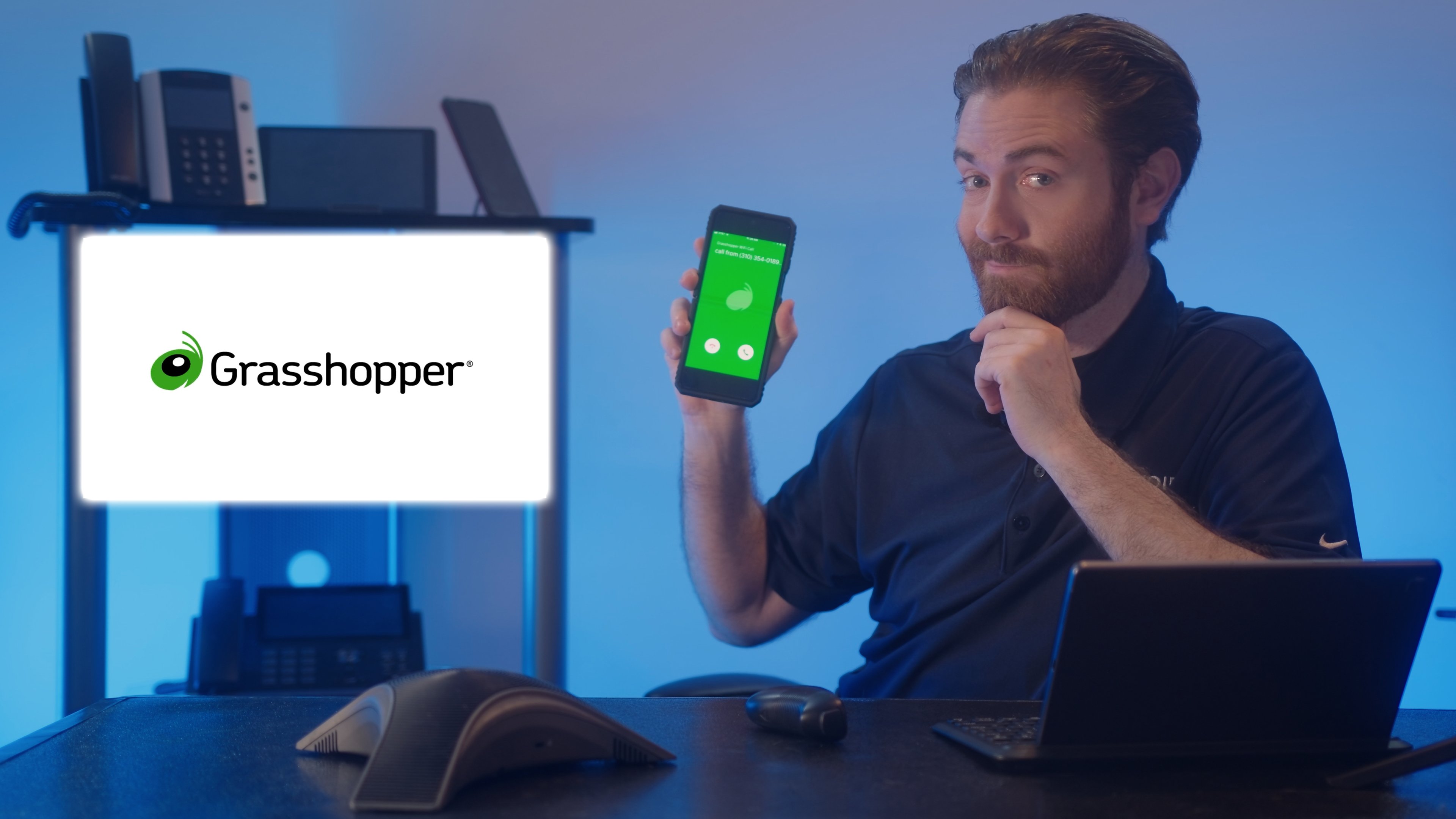
Grasshopper is a VoIP phone service and communication platform for startups, small businesses, and entrepreneurs. Grasshopper offers only basic phone system features, like toll-free or local business phone numbers, call routing, voicemail, and call recording. Its easy-to-use mobile app allows users to manage their business phone calls and messages on-the-go.
Grasshopper offers low prices and charges a flat monthly fee instead of charging per user like most competitors. Grasshopper is popular with small businesses and solopreneurs who need a professional phone presence but don’t need or have the resources for a full-scale UCaaS platform.
Grasshopper is a Good Alternative to OpenPhone if You Need:
- A startup solution: Grasshopper’s flat monthly rates are perfect for entrepreneurs and startups
- A voice/text only system: Grasshopper has a clean interface without video conferencing or advanced routing features
- A user friendly solution: Grasshopper’s minimalist user interface is quick and easy to set up and use
Pricing & Plans
Grasshopper pricing is structurally different from OpenPhone pricing. Grasshopper offers three flat monthly rates with no per user fees. All features are included in every plan and the difference in pricing comes down to the number of phone lines and extensions. Grasshopper is only slightly cheaper than OpenPhone, and the two providers are similar in reliability, security, and features. The main difference is that OpenPhone integrates with third party applications like Gong, Salesforce, and Google, while Grasshopper does not.
Grasshopper offers 3 pricing plans. All features are included in all plans.
- True Solo ($15 per month): Includes one user, phone number and extension
- Solo Plus ($25 per month): Unlimited users, one phone number and three extensions
- Small Business ($55 per month): Four phone numbers and unlimited extensions
Key Features
- Business SMS: Agents can send/receive text messages using their business phone number, use an instant reply feature to automatically text missed callers back, and automatically provide call back details or other key information
- Call Forwarding: Call forwarding redirects incoming calls to other phone numbers or services such as voicemail, a home phone, or a colleague’s smartphone
- Live virtual receptionist: (Add-on only) Live, US-based agent virtual receptionist service via a collaboration with Ruby Receptionist to answer incoming business phone calls, take and share call notes, and collect customer information.
- Voicemail transcription: Converts voicemails to text so they can be read on a computer, iPhone, or Android device
User Experience
Like OpenPhone, Grasshopper emphasizes voice and text functionality without extras like video conferencing. Unlike OpenPhone, which has six pre-built integrations, Grasshopper does not offer any out-of-the-box integrations.
Overall, Grasshopper has an intuitive interface and forgiving learning curve with only the bare essentials when it comes to phone system features (call forwarding, voicemail, virtual fax, etc.).
Grasshopper Pros
- Grasshopper’s platform and user interface is clean and intuitive
- Grasshopper is affordable and one of the only VoIP providers to offer flat monthly rates without per user fees
- Grasshopper offers local and toll free VoIP numbers to all users
Grasshopper Cons
- Like OpenPhone, Grasshopper does not offer any video conferencing capabilities
- Grasshopper does not have the team messaging capabilities that OpenPhone has with its collaborative inboxes
- Grasshopper does not offer advanced security features such as multi-factor authentication and SSO
Should You Choose OpenPhone or an Alternative?
If you are still not sure which UCaaS solution to choose or if you need an alternative at all, we've done the breakdown of best use cases for OpenPhone and other providers.
Keep in mind that the right business VoIP provider will vary vary according to company size, budget, security requirements, and customer expectations. Consider required communication channels, features, integrations, and overall user experience when choosing your business phone system.
For businesses that require a simple voice solution at an affordable price, OpenPhone is an excellent option. However, OpenPhone users should expect limited security and customer support options, alongside only basic reporting.
Look at the breakdown below if you need further help.
When to Use OpenPhone
- Affordability is a main concern: OpenPhone offers some of the lowest prices in the UCaaS space while still providing unlimited calling and messaging, call recording, and voicemail transcription
- You need a voice-centric solution: OpenPhone does not offer as many communication channels as competitors, but it provides solid telephony service with user-friendly dashboards
- Team members collaborate on calls/contacts: OpenPhone’s interface provides an inbox for each phone number where all team members have access to conversations and can collaborate and stay organized
When to Use an OpenPhone Alternative
- Your business uses video conferencing: OpenPhone does not have a native video conferencing platform
- Security is a concern: OpenPhone does not offer advanced security features such as HIPAA compliance or SSO
- Customer support is a priority: OpenPhone does not include live customer support in most plans

